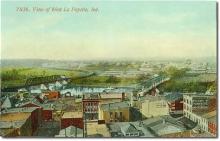
I arrived in West Lafayette in early September 1967 from Chicago. As a big city guy, I was dismayed by the lack of restaurants, chain stores and restaurants, and lots of hip coffee shops. Over the years such enterprises, big and small, arrived.
But West Lafayette maintained its small-town flavor. Folks could bike to work, drive in town and to Lafayette in short order, and roads were clear of traffic.
Some nice small-scale innovations were added to the commercial terrain: farmers markets, live jazz music, a local brewery, and bike trails. Despite my big city snobbishness, I began to feel at home in both West Lafayette and Lafayette. Returning to Chicago became a hassle as I adapted to small town living.
In addition, the little West Lafayette “downtown” was quaint, an awesome book shop, an ancient bar, a few coffee shops.
And at the university, there were old, boring (to some) red brick buildings, lots of grass, and a traditional college campus feel.
But over the last half decade, the sleepy and comfortable town has been transformed into a center of ugly high-rise apartments, enormous auto congestion, inaccessible parking, puzzling bicycle routes, and dramatically increased population density. And the campus is being transformed into a site for space age buildings, expanding westward destroying green space, with new housing and research installations.
The city of West Lafayette has embraced negative features of an urban development model. And the campus sees itself as a University of California Berkeley style multiversity (minus liberal arts excellence) coupled with a high-tech military research center, a kind of Pentagon west.
One can add that while racism still exists in the community, West Lafayette is no longer an informal “sundown” town which it was when we arrived. People of color can now live in the community even though reported incidences of racism continue.
In sum, while there has been some diminution of intolerance, West Lafayette is on a trajectory of unbridled development that is unsustainable. And the campus is being transformed into a Midwest center of a corporate/military/industrial complex.
Neither are sustainable. Both are destroying what was interesting about living in the community and working at the university.
Harry Targ
